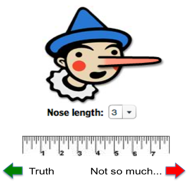 A new study in the journal Frontiers in Cognitive Science found that after only 20 minutes of practicing their cover story, liars could respond just as quickly and easily to lies as to the truth. Moreover, they were no more likely to slip-up on falsehoods than on the truth.
A new study in the journal Frontiers in Cognitive Science found that after only 20 minutes of practicing their cover story, liars could respond just as quickly and easily to lies as to the truth. Moreover, they were no more likely to slip-up on falsehoods than on the truth.
Xiaoqing Hu, co-author of the study and psychology doctoral candidate at Northwestern University said, ” After a short time of training, people can be very efficient at lying. The difference between lying and being honest has been eliminated after the training.”
LiveScience reports that lying takes a lot of brainpower!! It requires holding contradictory information in mind (the truth and the lie), while inhibiting the urge to tell the truth. “Lying is a difficult, because honesty is the default communication mode,” Hu told LiveScience.
Past studies have shown that lying without any practice is much more difficult to hide. This study, however, takes into account that many criminals practice their lies a lot before they begin telling them.
Researchers had volunteers answer various ‘Is this true of you?’ questions for several different facts. The researchers measured their response time and accuracy. Then participants were asked to practice lying by pressing yes when it should be no and vice versa.
After over 200 trials, which is approximately 20 minutes of practice, the liars were indistinguishable from the truth -tellers on accuracy and response time.
”But in the real world, after a crime, there is usually a delay between the crime and the interrogation,” giving the criminal a chance to practice their falsehood, Hu said.
What do you think about practicing lies ?
Do you think that practice helps you lie better ?